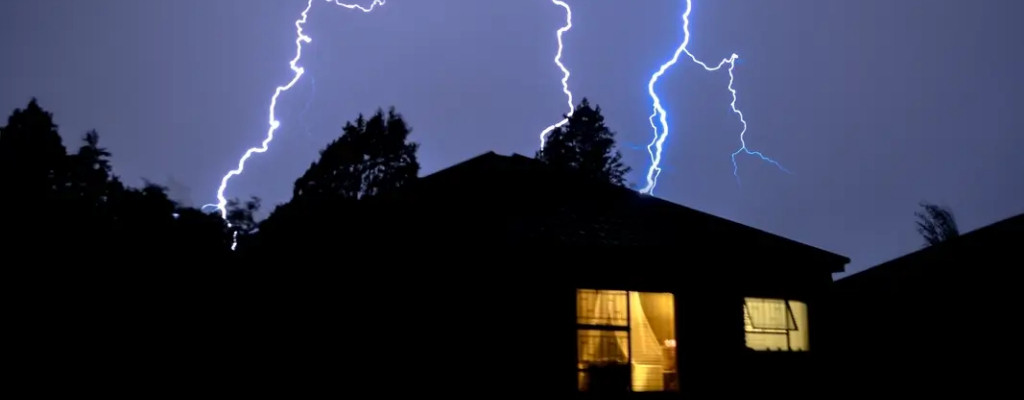When summer peaks, see also: NOW – your central air conditioning system works overtime to keep your Northeast Ohio home cool and comfortable. While summer days are often warm and beautiful, Ohioans are no strangers to dangerous weather. Severe storms, days with extreme heat and humidity, high winds – they can all impact your air conditioner’s efficiency, performance, and longevity. Our experts are here to educate you about how our unpredictable summer weather can affect your AC system and how to protect it.
Efficiency
Summer’s long periods of high temperatures force your air conditioner to run almost constantly, causing a spike in your energy bills. If your AC system isn’t designed well or it’s installed improperly, it can struggle to meet your family’s cooling demands under these extreme conditions.
Instead of turning your thermostat way down and overworking your unit, consider these alternatives to take some of the burden away from your AC. Set your thermostat to 76 or even a little higher, and turn your ceiling fans up a notch or two. Spend more time on the first floor of your home, or even in the basement, where it’s nice and cool year-round. If you just can’t stand it inside, head to the lake or play in the pool to cool off.
Performance
Severe weather conditions can negatively affect how well your air conditioning unit performs. We mentioned above that your AC is overworked to maintain the set temperature on hot days. In fact, it may never achieve the temperature you’ve set. This additional workload can eventually cause a breakdown.
Excessive humidity also presents a challenging situation. Even though air conditioners are designed to dehumidify the air as they cool it, summer’s excessive humidity can put extra pressure on your system. This can result in diminished performance and a stuffy home that your AC can’t cool as well as it normally can. Using a standalone dehumidifier complements your air conditioner and keeps your home much more comfortable to live in.
Severe weather damage
Heavy rain, wind, and hail can all harm your outdoor condenser unit. Blown debris from storms can batter the unit’s enclosure and accumulate to prevent airflow and decrease system efficiency. If flooding occurs, terminal damage can ruin your AC. Even if you manage to avoid that disaster, corrosion or short-circuiting will likely follow, shortening the life of your air conditioner. Your outdoor AC unit is vulnerable to severe weather, but you can take steps to safeguard it. Here’s how to protect your air conditioner from inclement weather.
Install your air conditioner in the shade. A shaded condenser unit doesn’t have to work hard, increasing its efficiency and extending its life span. If possible, place it on the north or east side of your home or somewhere else that is shady during the hot afternoon.
Construct an air conditioner shelter. Many homeowners surround their outside condenser units with a lattice enclosure to conceal them and beautify their property. You can take the extra step of building a lattice roof above your AC to keep falling and flying debris from landing on it and causing damage. Just make sure you retain access to the unit for cleaning and those seasonal tune-ups by our neighborly team!
Maintain your HVAC system each year. Seasonal maintenance is cost-effective and enhances your AC unit’s reliability and longevity. After all, a well-tuned air conditioner is less likely to break down under the stress of high temperatures or excessive humidity. Routine cleaning, filter replacement, and a detailed inspection by one of our professional technicians will ensure your system remains in tip-top shape and stays ready to keep you cool and comfortable in any weather conditions.
Install a surge protector. Power surges are common during severe storms, and they can irreparably harm your AC unit’s electrical components. Adding a surge protector provides an extra layer of defense. If your budget doesn’t allow for that, you can simply flip the circuit breaker to turn off your HVAC equipment during severe weather.
Elevate your outdoor unit. If your home is in a low area, rising water can flood your condenser’s internal components. Consider raising it on a secure platform to keep it well above flood level and ensure it doesn’t fall over in high winds.
Remove all yard debris. It’s a smart move to keep the space around your air conditioner clear of loose objects that could become damaging projectiles. Dead tree limbs, brush, lawn furniture, and toys can all be picked up by a strong wind and hurled at your unit. A tidy yard is your AC’s best friend.
Best practices for your AC after a storm
Following severe weather, follow these easy steps to make sure your air conditioner will continue to run safely.
Conduct a visual inspection. When the sky clears, head outside and give your condenser unit a thorough looking-over. Search for dents and exposed wires, and ensure it hasn’t moved off its base.
Clear all debris. Remove tree limbs, leaves, and other blown debris to maximize airflow and efficiency.
Be alert for water damage. If your neighborhood suffered flooding, closely examine your HVAC equipment for water damage. If you believe more water than just some rain entered the unit, it’s crucial to turn it off until you have our team professionally inspect it.
Schedule an immediate repair. In the case of storm damage, please don’t postpone air conditioning repair. By procrastinating, you risk a safety hazard, an increased energy bill, a reduced equipment life span, or even a total system failure.
Hey Neighbor Heating & Cooling has your back in bad weather
Nobody wants to worry about the impact of severe weather, but it’s essential to be prepared and to have a recovery plan. Our Trane Comfort Specialist team offers post-storm inspections and repairs to ensure your air conditioning system works safely and efficiently for many years to come. We can handle all of your AC service needs in Northeast Ohio, from quick repairs to custom replacements. Don’t let unpredictable weather ruin your family’s comfort – give us a call for more information or to schedule a visit today!


Comments are closed